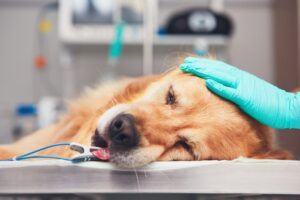Anesthesia is a common and necessary part of many veterinary procedures, but it can be a source of worry for many dog owners. This is because, similar to anesthesia for humans, anesthesia for pets comes with its share of risks. In today’s blog, we’ll discuss the safety of anesthesia for dogs, what to expect when your dog undergoes anesthesia, and how our veterinarians at Mills Animal Hospital in Acworth, GA, ensure the process is as safe as possible. If you have any concerns or need more information, please contact us at (770) 903-5995.

What is Anesthesia and How Does it Work?
Anesthesia is a medication that keeps your dog from feeling pain during surgery or other medical procedures. It can make your dog unconscious or just numb a specific area. There are different types of anesthesia, including general anesthesia, where your dog is completely asleep, and local anesthesia, which numbs a small part of the body. The type of anesthesia used depends on the procedure and your dog’s age and health.
The Safety of Anesthesia for Dogs
Pre-Anesthetic Testing
Before administering anesthesia, our veterinarians perform pre-anesthetic testing to check your dog’s overall health. These tests include blood work, which we use to check for hidden health problems that could make anesthesia risky. We also perform testing to assess liver and kidney function. By identifying issues early and making sure your pet’s major organs are able to handle the anesthesia, we can take steps to reduce risks, making anesthesia much safer for your companion.
Monitoring During the Procedure
During the procedure, our team closely monitors your dog’s vital signs. We monitor blood pressure, pulse oximetry levels, Co2 levels, EKG/heart, and temperature to ensure everything stays normal. This constant monitoring allows us to react quickly if something changes, and take steps to adjust your pet’s anesthesia and return their vitals to normal.
Fluid Support and Comfort
All of our patients have an IV catheter placed and receive IV fluids to help support their cardiovascular system while they are under anesthesia. The IV catheter allows us to titrate medications to effect, provide fluid therapy, and allows quick access if needed. Our patients under anesthesia are also surrounded by a warming device to keep them warm and comfortable.
Common Concerns About Anesthesia for Dogs
Risks of Anesthesia
Every medical procedure comes with some risks, and anesthesia is no different. However, serious complications from anesthesia are rare. The most common side effects are mild and temporary, such as grogginess or nausea after waking up. If your pet has an anesthesia procedure with us, we will discuss any specific risks based on your dog’s age, breed, and health condition.
Managing Anesthesia for Older Dogs
Older dogs often need special care when undergoing anesthesia. They may have age-related health problems that require additional monitoring or adjustments to the anesthesia plan. We consider these factors and take extra precautions to keep older dogs safe and comfortable. Sometimes, procedures must be postponed to treat or manage a health condition first.
Anesthesia for Dogs with Health Issues
Dogs with existing health issues, like heart disease or diabetes, can still undergo anesthesia safely with proper management. Our veterinarians will tailor the anesthesia plan to meet your dog’s specific needs, so any health conditions are carefully monitored and managed during the procedure.
What to Expect When Your Dog Undergoes Anesthesia
Preparing Your Dog for Anesthesia
Before your dog’s procedure, our veterinarians will give you detailed instructions on how to prepare. This might include fasting your dog for a certain period. Following these instructions reduces the risk of complications.
Post-Anesthesia Care
After the procedure, your dog will need time to recover from the anesthesia’s effects. They may be sleepy or a bit unsteady on their feet, and this is normal. We will provide guidelines for post-anesthesia care, including when to resume feeding and how to manage any mild side effects.
Signs to Watch For After Anesthesia
While most dogs recover from anesthesia without any problems, watch out for signs of complications. Contact us if you notice your dog is having trouble waking up, experiencing difficulty breathing, or showing signs of pain or swelling at the surgical site.
The Role of Our Veterinary Team in Ensuring Safe Anesthesia
Expertise and Training
Our veterinary team is highly trained in administering anesthesia to animals. Our expertise and experience contribute to a safer, more comfortable experience for your pet. We stay updated on the latest techniques and guidelines to provide the best care possible.
Tailoring Anesthesia Plans
Each dog is unique, and we tailor anesthesia plans to every pet’s needs, considering factors like age, breed, size, and health status. One size never fits all, and your pet’s safety demands a careful, customized approach.
Communication and Support
We’re advocates for open communication and value your thoughts and concerns. If you have any questions about your dog’s anesthesia, our team at Mills Animal Hospital is here to provide all the support and information you need. We will explain the process, discuss potential risks, and reassure you about the steps taken to ensure your dog’s safety.
When Anesthesia is Necessary
Anesthesia is often used for surgeries like spaying or neutering, mass removals, exploratory surgeries, cystotomy, gastropexy, dental cleanings, and various emergency procedures. It’s also used for diagnostic tests that require your dog to stay still, like X-rays or ultrasounds.
When considering anesthesia, we always weigh the benefits of the procedure against the risks of anesthesia. In many cases, the benefits of the procedure, such as improved health and quality of life for your pet, far outweigh the risks associated with anesthesia.
Making an Informed Decision
If your pet has an upcoming anesthesia procedure with us, we encourage you to discuss any concerns you have with our veterinarians. Understanding the steps we take to ensure safe anesthesia can help you feel more confident and comfortable with the overall process. If you have questions or need more information about anesthesia for dogs, please contact Mills Animal Hospital in Acworth, GA, at (770) 903-5995!
